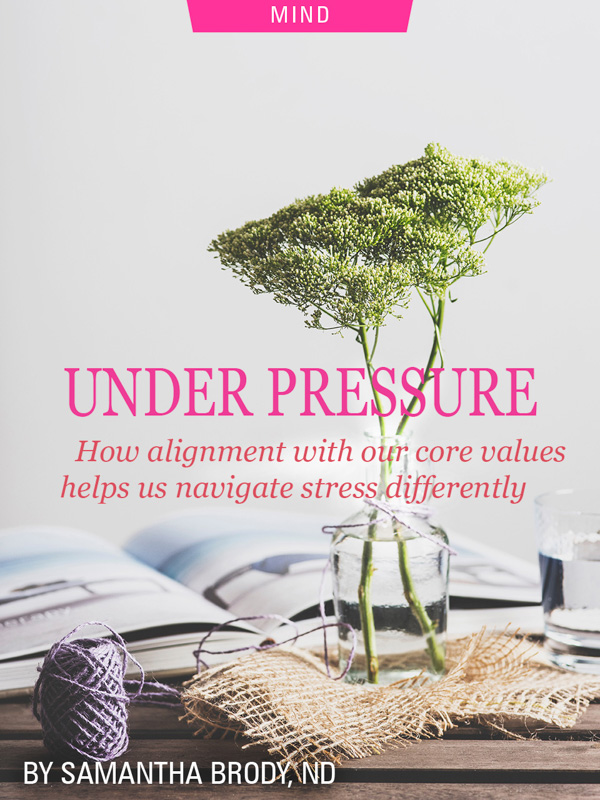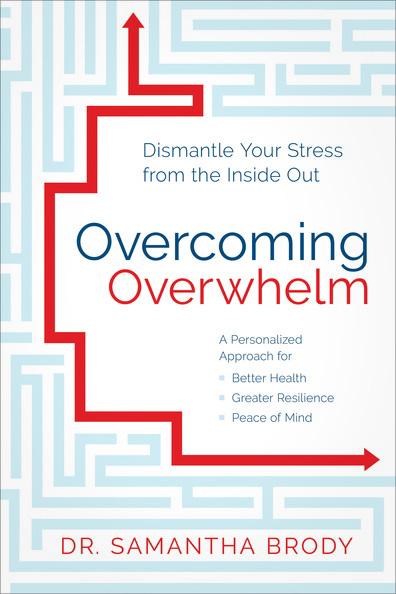Overwhelm seems to be the flavor of modern life. Realigning with our core values helps us shift the paradigm and navigate stress differently.
—
A stress can directly impact you when your body is burdened or overwhelmed beyond what it can reasonably manage or respond to, thus leading to dysfunction. For example, not enough sleep can decrease the functionality of your immune system. Using the same finger motion on your track pad day in and day out can lead to overuse tendinitis. Eating dairy when you’re sensitive can lead to persistent eczema.
Stress can also directly impact you via a chronic, ongoing production of stress hormones.
This can happen if you are consistently overwhelmed, on edge, or even reacting disproportionately to the day-to-day stresses in your life. Irregular sleep patterns, tight deadlines, excessive caffeine consumption, procrastination, and other stresses like traffic jams, skipping meals, or high-pressure jobs are all examples of day-to-day stresses that can lead to a chronic stress response.
The chronic production of adrenaline can lead to problems including premature aging, attention issues, fatigue, anxiety, and depression. The chronic production of cortisol can cause immune dysregulation, weight gain — particularly around your belly — digestive symptoms, depression, headaches, and reproductive issues.
Over time there is a risk that your body will lose the ability to respond properly to stress overall.
Naturopathic and other holistically minded physicians may refer to this loss of ability to respond appropriately to stress as adrenal fatigue.
Recent studies also show that stress is associated with “the body losing its ability to regulate the inflammatory response.” That means any condition ending in “-itis,” such as sinusitis (sinus inflammation), arthritis (joint inflammation), enteritis (small intestine inflammation), and others, if not caused by chronic stress, will be exacerbated by it. Even conditions such as depression, dementia, and age-related bone loss, which historically we never would have associated with inflammation, have been shown to have an inflammatory component and would therefore also be impacted by (or caused by) stress.
Stress can indirectly impact you when your system is generally overloaded or overwhelmed. In short…
If your body is overwhelmed with more stress than it can handle, it will manifest whatever symptoms you are predisposed to.
I call this predisposition a ‘weak spot.’ One person’s weak spot may be headaches; another’s weak spot may be gastrointestinal symptoms. It is the accumulation of stress, rather than one specific thing that leads to these symptoms. Remember, though, stress is not your enemy! It’s too much stress, or the wrong kinds of stress, that can have a direct and negative impact on your health, state of mind, and well-being.
Forward-Facing Health Goals
A few years back a friend told me, “I wake up with tons of energy because I’m excited about my day!” It struck me how very rare it is for people to feel that way — and this holds true for my patients and clients, my friends, and my family. Feeling subpar is epidemic. And it’s tied closely to overwhelm. Being overwhelmed always impacts health in one way or another, as your physical system is pushed beyond that which it can reasonably handle.
Addressing your health and getting to a better place with it is an important part of dealing with overwhelm. Having your mood, energy, and focus in tip-top shape also increases your bandwidth to deal with unexpected stresses and to make other changes.
Our health-care system in the United States (and most countries) is almost entirely framed in terms of disease — or how we don’t want to feel.
As a physician, I know that identifying how you do want to feel — mentally, emotionally, and physically — flips the discussion and allows space for crafting individualized plans that actually create optimal health and wellness.
True North Values
The Oxford English Dictionary defines values as “one’s judgment of what is important in life.” Our True North or core values are the values that are most important to each of us. If the choices we make on a day-to-day basis don’t line up with that which we deem to be important, we will necessarily be out of integrity with our own values. And it’s not just the big choices — whom we will marry, where we will live — but the small choices as well: what we eat, how long we’re on social media, which books we read, whom we socialize with.
It is indeed all of these choices (big and small) that add up to the totality of our lives.
Some of us base our core values on religious or spiritual beliefs; others base them on community norms; and some of us form our values according to our own individual code of ethics. Most of us base some values on each of these things. No two people will have identical core values.
Not only are each person’s core values different from everyone else’s, but they also vary over time. They can shift slightly, change profoundly, or just look different depending on the season of our lives. Take the woman who is sure she doesn’t want children — until she finds herself in a relationship with someone who inspires her to be a mom. Or the lawyer who is committed to making partner, but then gets cancer and decides that he wants to travel the world instead.
Shifting your values isn’t a sign of weakness; it’s a sign of having an open mind and an open heart.
We assess and adjust our values as we gather new information, as we have new experiences, as we change, as we grow. This means that we need to continually look at our values over time.
A Life of Alignment
If you don’t have the health you want, the energy you want, the peace of mind you want, the life you want, getting crystal clear about your core values is the first step to creating a road map to get there.
Examining your ideas and beliefs and making choices in accordance with your values can help you get out of ‘overwhelm’ and create the life you most want. If you don’t examine your ideas and beliefs, there are a number of problems that may occur.
First, you may end up living life by someone else’s rules, and you won’t choose the things that will lead you to where you really want to be. Second, if there is a discrepancy between your core values and the choices you make on a day-to-day basis, it will have a profound impact on your mood, health, and energy and will add significantly to your overwhelm. This can apply to little things, like getting into bed on time, or big things, like marrying someone who looks good on paper, but doesn’t really meet your heart’s desire.
Making choices that are out of sync with your values creates a dissonance that your subconscious picks up on.
This dissonance then leads to a sense of discomfort — anxiety, depression, general malaise — that can permeate well beyond any one decision and profoundly impact not only your state of mind, but also all aspects of your health and well-being. The stress of this dissonance, and the ensuing self-critical dialogue, can be so significant that it dwarfs the other stresses that are already overwhelming you day in and day out.
This dissonance can be so uncomfortable, in fact, that your subconscious will drive you to make choices to alleviate the discomfort — choices that make you produce dopamine (a hormone often called the ‘reward drug’ because it mediates pleasure in your brain in the immediate moment), such as overeating, eating sugar, having a drink, shopping, or whatever your vice of choice may be. And even though indulging in one of these activities feels good in the moment, it ultimately pushes you further away from a life of less overwhelm and greater ease.
I’m not saying that making choices in alignment with your values will cure all ill health or will mean you’ll never feel overwhelmed. Nor am I saying that we don’t sometimes need to compromise. But understanding what your values are is the foundation for understanding what you can and can’t let go of, what you can and can’t control, and what you can and can’t do to live a life aligned with what means the most to you.
The key is to keep your finger on the pulse of your life and to be aware at any given moment of what is indeed important to you.
You may also enjoy reading The ROI (Return on Investment) of Your Values by Ajax Greene

